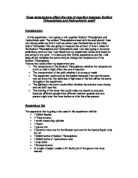Prediction
I predict that the rate of reaction will be fastest at high temperatures. When the temperature at which the reaction is carried out is increased, the energy that the particles hold also increases so the particles move faster. This means that there are more collisions between the Sodium Thiosulphate and Hydrochloric acid particles, and the collisions, which happen, are more violent and therefore more likely to react to form products. This means that if the temperature of the reaction is increased then the rate of reaction will increase.
Equipment
I am going to be using a range of equipment to prepare and then carry out my experiment. I will use a 100ml conical flask for the reaction, as I will be able to shake it and see the reaction take place with more ease. I will also be using a 100ml beaker for heating the chemicals in question and to heat it I will use a Bunsen burner, with a hating mat, tripod and gauze. A piece of paper will also be used for the cross underneath the reaction.
Procedure
Firstly I will measure out 50ml of Sodium Thiosulphate and 5ml of Hydrochloric acid using different measuring tubes. I will then put the Sodium Thiosulphate in the beaker and the Hydrochloric acid in the conical flask. The Sodium Thiosulphate will then be heated to the specific temperature and poured into the conical flask with the Hydrochloric acid, which will be sat upon the piece of paper with the cross on it. As soon as the Sodium Thiosulphate has been poured I will start the timer and stop it when the cross is no longer visible. This method will be repeated with each different temperature.
Results
I have taken two sets of readings and calculated the average to get more accurate results. I have also plotted these readings in Microsoft Excel and produced some graphs for better analysis of my findings. The results show that as the temperature increases the time taken for the chemicals to react decreases
From this graph you can see that as the temperature increases so does the rate of reaction
Conclusion
When the results are plotted on a graph you can see they follow a negative correlation in a curve that decreases less rapidly the higher the temperature gets. From my results and analysis I can conclude that as the temperature increases so does the rate of reaction. This is due to increased activity in the cells as the temperature increases, which causes more collisions that result in a reaction between the two cells involved. This strongly supports my prediction in which I stated that the rate of reaction would increase with the temperature.
Evaluation
The experiment I used to undertake my experiment was suitable in that I got accurate results but that it was affected by the heating and human error. Heating the Sodium Thiosulphate was difficult as if you heated it to the right temperature and then removed the heat the temperature still increased due to the heat of the glass. You had to heat it too under the right temperature and let it rise to the right one but even then it was still not completely accurate. It was a fair test as I used the same apparatus to measure out the different solutions and washed the conical flask, which contained the reaction thoroughly with distilled water between each experiment. My results were fairly accurate and would only be affected by human error which could be slow reactions or that whether you were not sure if the cross had gone or not(which was probably due to the glass of the flask obscuring vision). I have also measured the results to 1/100 of second, which makes them more accurate. I only had one anomalous result at 50°c, which does not quite follow the line of best fit that probably occurred due to human error. Also for the readings at 30°c I had two results that were very far apart compared to the other results but the average evened out and fits with the rest of the results. I think that both the results were out in either direction but evened out in the average. Other than these anomalies my results were accurate and the gap between them were all under 1 second.
I think my results were fairly reliable. Modifications that I would do next time would be to use a normal beaker to contain my reaction as then I could look down onto the reaction and my vision wouldn’t be blurred by the glass of the flask. I would also use a machine to constantly shake the flasks as then it would not be unfairly done and all the reactions would get equal shaking. I would also use heating apparatus to remove the problems, which I stated earlier. I think the range of results I used was sufficient but if I wanted to get more accurate findings then I could measure to every 5°c rather than 10°c and take another set of readings to get a more accurate average.







